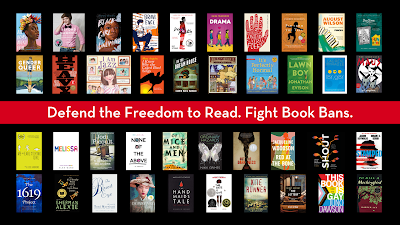Recently, I was writing the Acknowledgements for my upcoming memoir, Honeymoon at Sea: How I Found Myself Living on a Small Boat. Before I got into the myriad people and groups who helped me, I wrote this: "My first and last gratitude is to my parents, who taught me to love reading and writing. They read a lot. They read widely. Most important, they never forbid us to read any book." I wasn't expecting that last sentence when I started typing. Sometimes, we don't actually know how important something is to us, until we start writing about it.
In the last few years, I've been appalled to see how large swaths of our country have been slipping backwards in terms of human rights, by limiting the personal rights and freedoms of certain citizens. One way this is happening is through banning books. Let's face it, banning books is basically banning thought. As someone wisely said, "If you're afraid that books might change someone's thinking, you're not afraid of books, you're afraid of thinking."

Looking back, I can't imagine my childhood without books. Certain books I read helped me to deal with issues in my own life, like Judy Blume's Are You There, God? It's Me, Margaret. I would have hated to have that book be unavailable, deemed too adult for my ten-year-old self. Or Blume's book Forever, for that matter, which I read a few years later. I've always believed that shielding children from reading books on controversial subjects is like bleeping out "bad" words; it makes no sense, since kids who already know the word won't be harmed by hearing it, and neither will those youngsters who don't know the word—though it might trouble the parent who has to deal with the question of what that word means, when they are asked. And of course, troubled parents are the people who most often start these book bans, often backing up their fears with religion.
I was so moved by reading the book Melissa (previously published as George), and I kept thinking, as I read it, of the immense good it could do to some scared, lonely child who read it and figured out why they were always so confused and unsure about their gender. I cannot imagine that any book could make someone confused and unsure about their gender, but reading about the subject might engender some empathy for other people, or it might raise questions about gender, and aren't caring and curiosity still considered good things?
The strange thing about all the fear people have about everything from "dirty" books to the supposed "grooming" and "sexualization" of children is that untold generations of people have grown up surrounded by nothing but heterosexual role models and a significant percentage of those generations of people have grown up to realize (and some have realized long before they were grown) that they were different, that their life was going to diverge from the lives of their parents and their peers. No one knows why, but what does that matter? It is clear that, over many many years, most LGBTQIA+ people were raised by people who were heterosexual, or at least behaved as if they were.
Naturally, not all book banning has to do with sex. Lately, books have also been challenged due to the inclusion of what some people call "woke ideology." Often this means simply that the subject of the book —perhaps an unvarnished aspect of actual history, such as slavery and genocide in America—makes an adult uncomfortable, or guilty, and they want to spare their child the same feelings. But isn't the ability to experience the trials and woes of someone who is not like you one of the wonders of reading? I remember crying as I read The Diary of Anne Frank, and I wouldn't want to have grown up without that experience. I also cried when I read Sounder as a child, and, in my teens, when I read I Know Why the Caged Bird Sings and Roots.
How will we move forward as a society if we are unwilling to accept that all of our history, good, awful, and tragic, was a part of what led us to the present day? If being awakened to that is considered a bad thing, then what are we, as a people, to celebrate—staying asleep under a comforting blanket of ignorance? That is not a society that I want to be a part of, and I am willing to fight to keep future generations from growing up uneducated, unconscious, and unaware. I hope you will join me.
One way we can fight back is by joining groups who are actively resisting censorship and book bans. One of those groups is Pen America, others are Unite Against Book Bans and EveryLibrary. There are many others, both local and national; please search out a group in your community and support them in whatever ways you can. I will be grateful, and so will future readers.
I'll be posting more about my book's upcoming publication, along with a couple more book reviews, very soon. Hope your summer is going swimmingly.
Hasta pronto!




